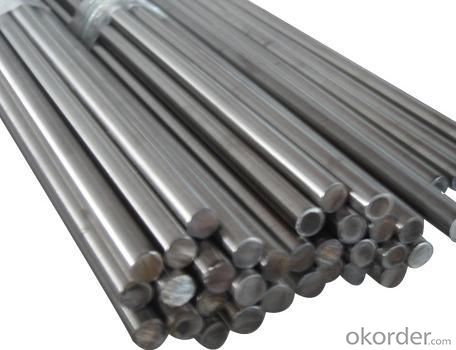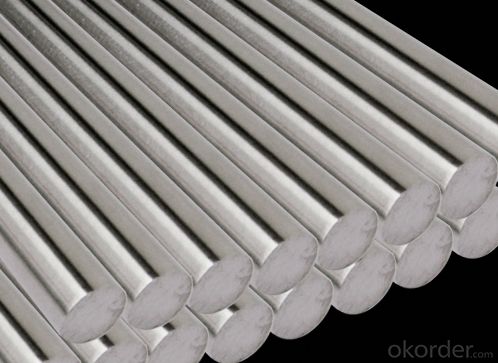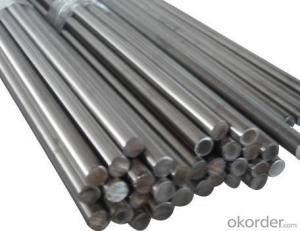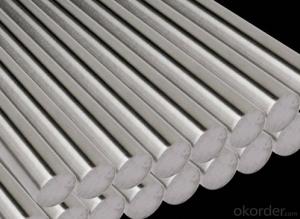A36 Round Steel Bar Large Quantity in Stock
- Loading Port:
- Dalian
- Payment Terms:
- TT OR LC
- Min Order Qty:
- 5 m.t.
- Supply Capability:
- 10000 m.t./month
OKorder Service Pledge
OKorder Financial Service
You Might Also Like
Item specifice
A36 Round Steel Bar Large Quantity in Stock
Quick Details
Standard: | JIS, AISI, ASTM, DIN, EN | Dimensions: | c45,1020,q235,Q345,A36 | Grade: | 200 Series |
Place of Origin: | China (Mainland) | Brand Name: | steel | Model Number: | carbon steel,mild steel |
Type: | Round | Application: | Hot Work Tool Steel/Plastic Molds | Shape: | Round |
Certification: | BV | Special Use: | Valve Steels | Technique: | hot rolled,cold drawn,forged |
Packaging & Delivery
Packaging Details: | Usual seaworthy export packing |
Delivery Detail: | 15 days |
Specifications
1.Competitive price
2.Prime quality
3.Best service
4.Quick deliver time
5 BV ,SGS
Description
Description | Carbon Steel Rod/Carbon Steel Bar,carbon steel rod,carbon steel shaft,mild steel bar, mild steel shaft,ms bar | |
Material | ASTM | 1005,1006,1008,1010,1015,1020,1025,1030,1035, 1040,1045,1050,1055,1060,1065,1070,1080,1084, 1016,1022 |
DIN | Ck10,Ck15,Ck22,Ck25,Ck30,Ck35,Ck40,Ck45,Ck50, 30Mn4,40Mn4 | |
BS | 040A04,095M15,045M10,080A40,045M10,080M50 | |
Standard | GB/T799,ASTM A29,A108,A321,A575,BS970,DIN1652,JIS G4051 | |
Section shape | Round,square,hexagonal,flat,angle | |
Surface | Black painted,galvanized | |
Specifications | Round bar | Diameter: 4mm~800mm |
Angle bar | Size: 3mm*20mm*20mm~12mm*800mm*800mm | |
Square bar | Size: 4mm*4mm~100mm*100mm | |
Flat bar | Thickness: 2mm~100mm | |
Width:10mm~500mm | ||
Hexagonal | Size: 4mm~800mm | |
Length | 2m,4m,5.8m,6m,11.8m,12m or as required. | |
Trade terms | Payment terms | T/T,L/C,Western Union |
Price terms | FOB,CIF,CFR,EXW | |
Package | Bundled,wooden box for export standard package. | |
Export to | Ireland,Singapore,Indonesia,Ukraine,Saudi Arabia,Spain,Canada, USA,Brazil,Thailand,Korea,Italy,India,Egypt,Oman,Malaysia, Kuwait,Canada, Viet Nam, Peru,Mexico,Dubai, Russia,etc | |
Delivery Time | Normally according to the order quantity | |
Application | Carbon steel rod applies to chemical industry, shipping industry, manufacturing industry,construction,decorate Industry,electric power,pump shafts, sanitary wares,furniture handles,boiler,high temperature resistant,low temperature resistant, corrosion resistant. | |
Contacts | If you have any questions,please feel free to contact me. | |
Picture


- Q:How are steel pipes used in the pulp and paper industry?
- Steel pipes are widely used in the pulp and paper industry for various applications. They are primarily used for conveying corrosive chemicals, hot water, steam, and other fluids throughout the production process. Steel pipes provide high strength, durability, and resistance to corrosion, which is crucial in an industry where harsh chemicals are involved. They are used in the transportation of pulp, bleaching agents, and various liquids within the production facilities, ensuring efficient and reliable operations in the pulp and paper industry.
- Q:What is the role of steel pipes in the telecommunications industry?
- Steel pipes play a crucial role in the telecommunications industry as they are used for the installation of underground and overhead telecommunication cables. These pipes provide protection and support to the cables, ensuring their safety and longevity. Additionally, steel pipes are also used in the construction of communication towers and infrastructure, making them an essential component in establishing and maintaining reliable telecommunications networks.
- Q:How are steel pipes used in oil refineries?
- Steel pipes are extensively used in oil refineries for various purposes such as transporting crude oil, refined products, and gases throughout the facility. They are used in the construction of pipelines, process equipment, and storage tanks, providing a reliable and durable solution for handling the vast quantities of liquids and gases involved in the refining process.
- Q:What is the difference between steel pipe and polyethylene pipe?
- The main difference between steel pipe and polyethylene pipe lies in their materials and properties. Steel pipe is made from a durable and strong material, which makes it suitable for high-pressure applications and environments where strength is crucial. On the other hand, polyethylene pipe is made from a plastic material that offers flexibility and resistance to corrosion, making it ideal for underground and aboveground installations. Additionally, steel pipe requires welding or threading for connections, while polyethylene pipe uses fusion or mechanical fittings. Ultimately, the choice between steel pipe and polyethylene pipe depends on the specific requirements of the project and the desired characteristics needed.
- Q:How are steel pipes protected against microbial corrosion?
- Various methods are employed to safeguard steel pipes against microbial corrosion. One widely used technique entails applying coatings onto the surface of the pipes. These coatings act as a shield, effectively blocking the entry of microbes and their corrosive byproducts into the steel, thereby safeguarding it from degradation. Coatings like epoxy, polyethylene, and fusion bonded epoxy are frequently utilized to bestow this protection. Another method involves the use of corrosion inhibitors. These inhibitors are added to the fluid that flows through the pipes in order to impede microbial growth and prevent corrosion. They can be either organic or inorganic compounds that function by either eradicating the microbes or inhibiting their metabolic activity. Furthermore, ensuring proper maintenance and cleaning of the pipes is vital in preventing microbial corrosion. Regular inspections and cleaning routines aid in the elimination of any biofilms or microbial deposits that may have formed on the pipe's surface. This significantly reduces the likelihood of microbial corrosion and prolongs the lifespan of the pipes. In certain cases, cathodic protection may also be employed. This method entails utilizing sacrificial anodes or impressed current systems to supply a protective electrical current to the pipe. This current helps prevent the formation of corrosive microorganisms and shields the steel from corrosion. In summary, a combination of coatings, corrosion inhibitors, regular maintenance, and cathodic protection techniques are employed to protect steel pipes from microbial corrosion. By utilizing these strategies, the longevity and integrity of the pipes are ensured, benefiting various industries such as oil and gas, water supply, and sewage systems.
- Q:What is the difference between internal lining and external coating of steel pipes?
- The internal lining of steel pipes refers to a protective layer or coating applied inside the pipe to prevent corrosion and to enhance the flow of fluids. This lining is typically made of materials like epoxy, cement mortar, or polyethylene, and it helps to reduce friction and resist the effects of chemicals or contaminants that may be present in the fluid being transported. On the other hand, the external coating of steel pipes is a layer or coating applied to the outside of the pipe to protect it from external factors like weather, soil, or mechanical damage. This coating is usually made of materials such as fusion-bonded epoxy, polyethylene, or polypropylene, and it acts as a barrier against corrosion, moisture, or abrasion. In summary, the internal lining of steel pipes focuses on protecting the pipe from the inside, while the external coating is intended to safeguard the pipe from external elements. Both the internal lining and external coating are essential for maintaining the integrity and longevity of steel pipes.
- Q:How are steel pipes protected against abrasive wear?
- Steel pipes are protected against abrasive wear through various methods such as using protective coatings, lining the pipes with wear-resistant materials, or employing internal or external liners. These measures ensure that the steel pipes can withstand the erosive effects of abrasive materials and extend their lifespan.
- Q:Can steel pipes be used for underground fuel storage systems?
- Steel pipes are an excellent choice for underground fuel storage systems. Due to their strength, durability, and resistance to corrosion, they are widely used in this application. By opting for steel pipes, one can rely on a secure and long-lasting solution for underground fuel storage. These pipes are capable of withstanding the pressure and weight of the fuel, making them suitable for this purpose. Moreover, their easy weldability and interconnectivity provide flexibility in designing and constructing such systems. However, it is crucial to ensure that the steel pipes used in underground fuel storage systems are properly coated or lined to prevent corrosion and protect the fuel from contamination. Regular inspections and maintenance play a vital role in identifying and addressing any potential issues that may arise.
- Q:How seamless steel tube is formed?
- Hot drawing or cold drawing. The so-called cold is the billet from the thick wall tube is not heated, oil lubrication, with a steel sleeve inside, gradually elongated. Hot drawing is to make the billet tube red, do such work, generally thick wall applicable.
- Q:What are the different types of steel pipe fittings for industrial applications?
- There are several different types of steel pipe fittings commonly used in industrial applications. These include elbows, tees, couplings, unions, reducers, flanges, and caps. Each of these fittings serves a specific purpose in connecting and directing the flow of fluids or gases within a piping system.
1. Manufacturer Overview |
|
|---|---|
| Location | |
| Year Established | |
| Annual Output Value | |
| Main Markets | |
| Company Certifications | |
2. Manufacturer Certificates |
|
|---|---|
| a) Certification Name | |
| Range | |
| Reference | |
| Validity Period | |
3. Manufacturer Capability |
|
|---|---|
| a)Trade Capacity | |
| Nearest Port | |
| Export Percentage | |
| No.of Employees in Trade Department | |
| Language Spoken: | |
| b)Factory Information | |
| Factory Size: | |
| No. of Production Lines | |
| Contract Manufacturing | |
| Product Price Range | |
Send your message to us
A36 Round Steel Bar Large Quantity in Stock
- Loading Port:
- Dalian
- Payment Terms:
- TT OR LC
- Min Order Qty:
- 5 m.t.
- Supply Capability:
- 10000 m.t./month
OKorder Service Pledge
OKorder Financial Service
Similar products
New products
Hot products
Hot Searches
Related keywords






























